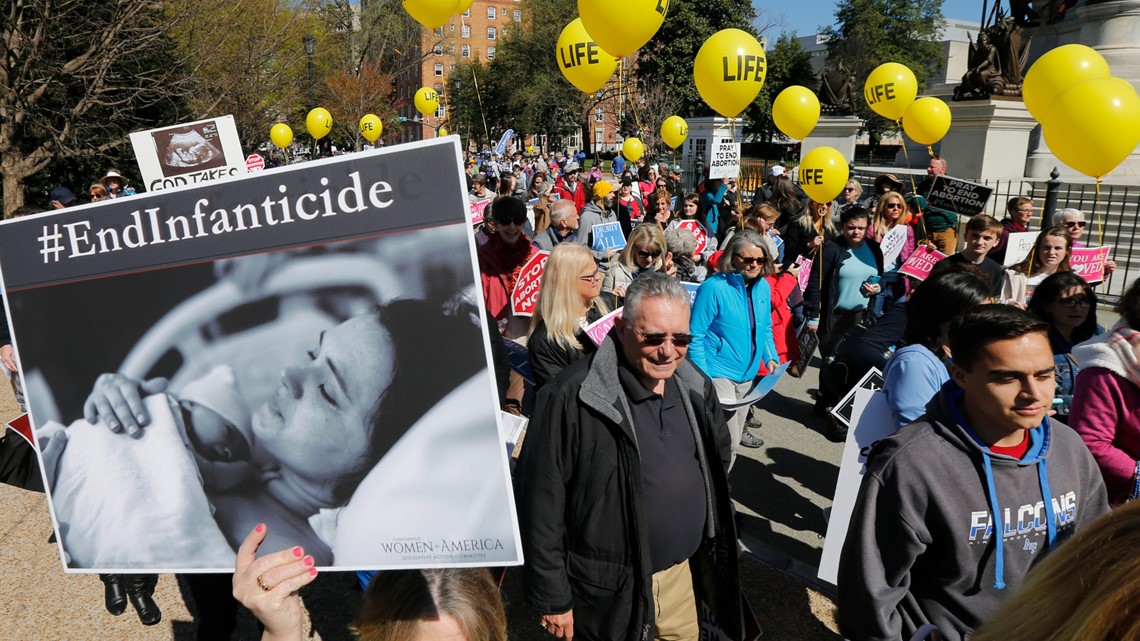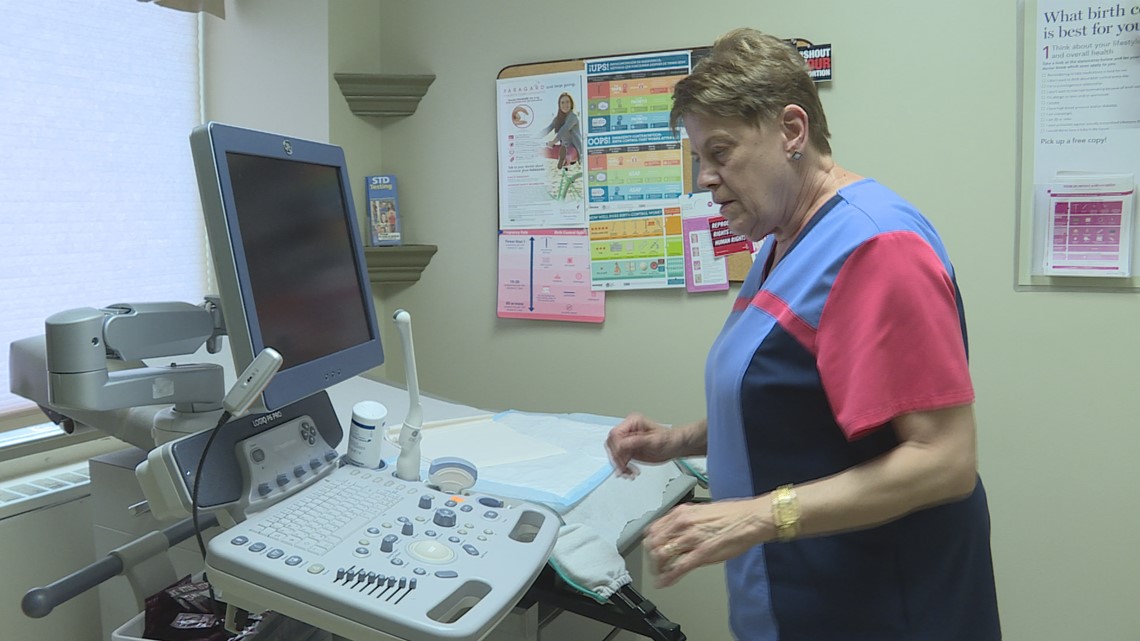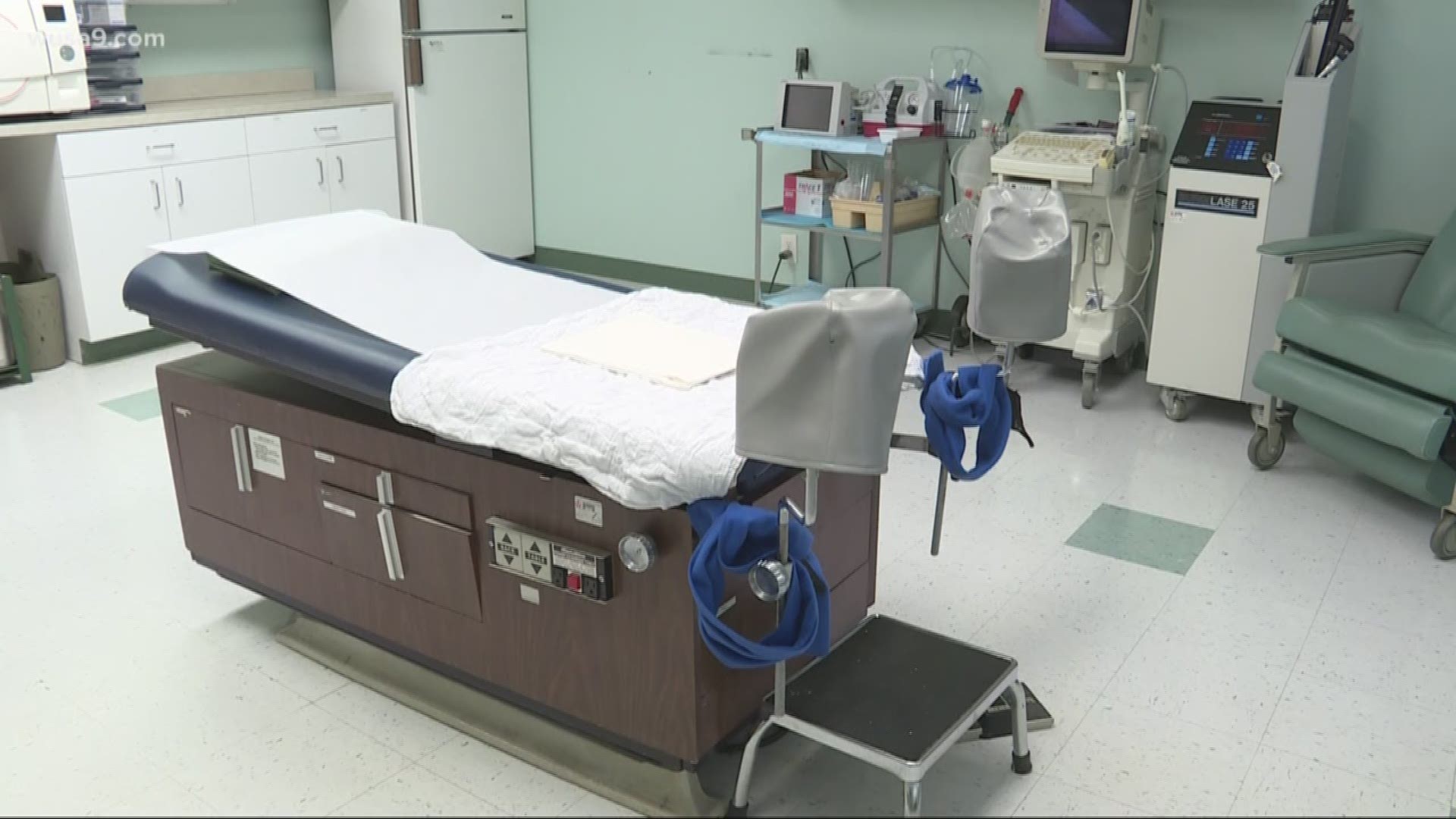FALLS CHURCH, Va. — Roe verses Wade, the Supreme Court case that that legalized abortion in 1973, is under several challenges from states across the country. So far this year, 19 states have enacted 58 abortion restrictions, more than half of those measures would ban the procedure.
Alabama has made providing abortions a felony unless a pregnancy seriously risks a woman’s health -- there aren't exceptions for rape or incest. Georgia, Kentucky, Mississippi and Ohio banned abortions after doctors can detect a fetal heartbeat, which is about at six weeks. That's before many women realize they're pregnant.
In Virginia, there’s a lawsuit underway to remove several statutes that limit and restrict abortions. The Falls Church Health Center is one of four Virginia clinics suing the state over laws they say are unnecessary and burdensome.


Penny Smith is a registered nurse who works at the woman-owned and operated Falls Church Healthcare Center which provides gynecological services, including first trimester abortions. Smith said she does this work to help women, and because of what she witnessed as young nurse in the late 1960s, when abortion was illegal.
"I saw first-hand women coming in to the emergency room who had tried to self-abort," Smith said. "Who drank all kinds of horrendous liquids including lye. Who had attempted to put a coal hanger up into their uterus to pull the pregnancy out. They were trying to self-abort and they were hemorrhaging. They were infected."
One story from that emergency room, she recalls vividly.
"I talked to many women who had illegal abortions in the alleyways of Chicago," Smith said. "And then the same person that did the abortion raped her and she had no recourse but to get up from the ally and go home."
She and Jan Fruiterman work together at the Falls Church clinic, and both support the Center’s legal challenge to four Virginia laws, they said restrict access to abortion and hurt women.
"This is a matter between a patient and their doctor," Fruiterman said. "Not the state, not churches. This is a fundamental issue of whether woman have a right to decide what they do with their own body."


The United States Supreme Court legalized abortion with its landmark ruling Roe v. Wade in 1973. Afterward, many states, including Virginia, passed laws regulating or limiting a patient's access to abortion. This lawsuit challenges those statues that have been in place since 1975.
One of those laws requires abortions be performed by a physician. The clinics argue it's such a safe procedure, a qualified health professional -- such as a nurse practitioner or physician’s assistant -- should be allowed to do them. Currently 41 states mandate physicians perform abortions. Only eight states and D.C. allow for qualified health professionals.
Victoria Cobb is the President of the Family Foundation -- a Virginia non-profit that opposes abortion rights using what the organization calls a "biblical worldview."
"This has been good law since 1975," Cobb said. "Let's start with the fact that this has a good practice for a long period of time. Very few states have anyone but a doctor doing an abortion."
Another law being challenged in the lawsuit, is the statute requiring second trimester abortions only be performed in hospitals. Nurse Penny Smith said physicians should make that decision. Not lawmakers.
She said there’s no medical necessity for the requirement.
"No," Smith said. "None whatsoever. Because they can go to Maryland or D.C. And have it done in an office, in a physician's office."
But The Family Foundation says the law provides added safety for women.
"This industry has tried to block every single thing that is important for women’s safety and is important to make sure the procedure is a good, safe procedure," Cobb said.
Virginia is one of only three states with the second trimester-hospital requirement. Virginia defines second trimester as 13 weeks and six days. Smith said doctors should decide when a woman needs to go to a hospital. Not lawmakers.
"If she’s 14 weeks and two days -- there’s really not a gestational difference in the procedure," Smith said. "And they’re upset. Why do I have to go somewhere else? It’s because the state had mandated that you either have to go to a hospital or go to another state."
Cobb said second trimester abortions should be done in hospitals because they may require surgical abortions which involve risks medication abortions do not have. She referred to testimony from a gynecologist at the recent trial.
"The reality is there are differences as they women, as her pregnancy moves forward, as the unborn child grows, the abortionist even talked about different instruments, different size of instruments, and different safety risks," Cobb said. She also argues the other two laws being challenged ensure women's safety and knowledge of the procedure they're seeking.
One of the laws requires the woman receive an ultrasound 24 hours prior to an abortion, so that the woman has an opportunity to view the sonogram.
"The 24 hour law has been in place for long over a decade store there was an ultrasound law. This all comes down to the idea of informed consent."
Fruiterman said that law isn't only medically unnecessary, but discriminatory and harmful.
"Can you imagine if you husband was going to have a colonoscopy and the state would regulate how he did that?" Fruiterman said. "First you have to go to the gastroentologist and be evaluated and examined. And then, after a 24-hour waiting period, you can come back and have your colonoscopy. Nobody would have a colonoscopy."
But Cobb said the law boils down to consent.
"This all comes down to the idea of informed consent," Cobb said. "We’re essentially saying that women have all the information they need so they can make a great decision that is best for them, that 24-hour period has been in place since 2002.”
The lawsuit also challenges the statute that requires clinics that provide five or more abortions, meet hospital grade regulations for health, hygiene, sanitation, safety and construction -- which includes things like the width of halls and doorways. That part of the law has been too expensive for many clinics. Forcing them to close.
"What's the difference between five and three and seven?" Fruiterman said. "You do the exact same procedure whether you're in the clinic or office. No safer difference, not medically required ... Because they were unable to overturn Roe v. Wade, they thought they'd try to regulate it to death. And that's what this is all about."
The judge hearing the Virginia abortion clinic lawsuit is expected to issue his decision by November
"We think it’s tragic to hear that the abortion industry, that claims it’s all about women, do anything that would sacrifice the safety of women as they oversee this industry," Cobb said.

